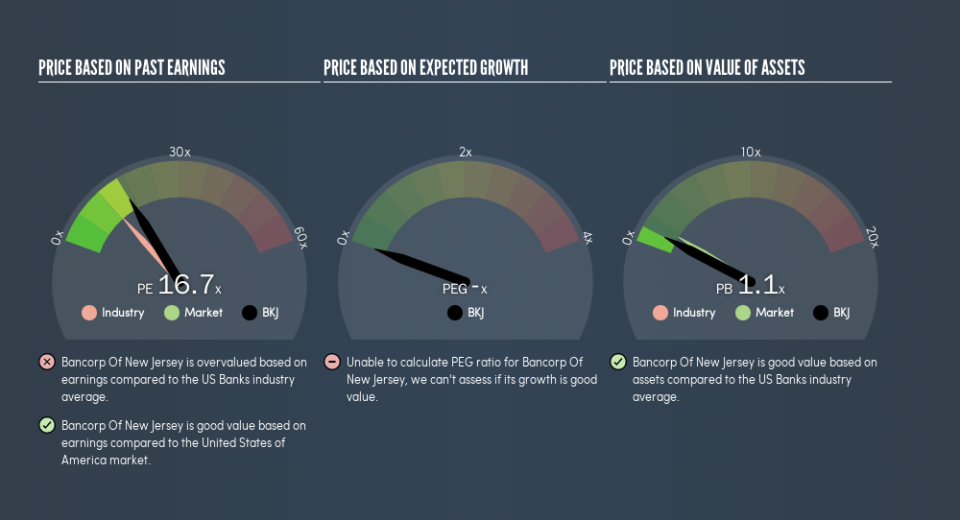What Does Bancorp Of New Jersey, Inc.'s (NYSEMKT:BKJ) P/E Ratio Tell You?

This article is for investors who would like to improve their understanding of price to earnings ratios (P/E ratios). We'll look at Bancorp Of New Jersey, Inc.'s (NYSEMKT:BKJ) P/E ratio and reflect on what it tells us about the company's share price. Based on the last twelve months, Bancorp Of New Jersey's P/E ratio is 16.7. That means that at current prices, buyers pay $16.7 for every $1 in trailing yearly profits.
Check out our latest analysis for Bancorp Of New Jersey
How Do You Calculate A P/E Ratio?
The formula for P/E is:
Price to Earnings Ratio = Price per Share ÷ Earnings per Share (EPS)
Or for Bancorp Of New Jersey:
P/E of 16.7 = $13.39 ÷ $0.80 (Based on the trailing twelve months to March 2019.)
Is A High Price-to-Earnings Ratio Good?
A higher P/E ratio implies that investors pay a higher price for the earning power of the business. That is not a good or a bad thing per se, but a high P/E does imply buyers are optimistic about the future.
How Does Bancorp Of New Jersey's P/E Ratio Compare To Its Peers?
The P/E ratio essentially measures market expectations of a company. As you can see below, Bancorp Of New Jersey has a higher P/E than the average company (12.3) in the banks industry.
Bancorp Of New Jersey's P/E tells us that market participants think the company will perform better than its industry peers, going forward. Shareholders are clearly optimistic, but the future is always uncertain. So further research is always essential. I often monitor director buying and selling.
How Growth Rates Impact P/E Ratios
Generally speaking the rate of earnings growth has a profound impact on a company's P/E multiple. That's because companies that grow earnings per share quickly will rapidly increase the 'E' in the equation. And in that case, the P/E ratio itself will drop rather quickly. And as that P/E ratio drops, the company will look cheap, unless its share price increases.
It's nice to see that Bancorp Of New Jersey grew EPS by a stonking 45% in the last year. And it has bolstered its earnings per share by 1.4% per year over the last five years. With that performance, I would expect it to have an above average P/E ratio.
Remember: P/E Ratios Don't Consider The Balance Sheet
The 'Price' in P/E reflects the market capitalization of the company. That means it doesn't take debt or cash into account. Hypothetically, a company could reduce its future P/E ratio by spending its cash (or taking on debt) to achieve higher earnings.
Spending on growth might be good or bad a few years later, but the point is that the P/E ratio does not account for the option (or lack thereof).
So What Does Bancorp Of New Jersey's Balance Sheet Tell Us?
With net cash of US$13m, Bancorp Of New Jersey has a very strong balance sheet, which may be important for its business. Having said that, at 13% of its market capitalization the cash hoard would contribute towards a higher P/E ratio.
The Bottom Line On Bancorp Of New Jersey's P/E Ratio
Bancorp Of New Jersey has a P/E of 16.7. That's around the same as the average in the US market, which is 17.6. The excess cash it carries is the gravy on top its fast EPS growth. So based on this analysis we'd expect Bancorp Of New Jersey to have a higher P/E ratio.
Investors should be looking to buy stocks that the market is wrong about. If it is underestimating a company, investors can make money by buying and holding the shares until the market corrects itself. We don't have analyst forecasts, but you could get a better understanding of its growth by checking out this more detailed historical graph of earnings, revenue and cash flow.
You might be able to find a better buy than Bancorp Of New Jersey. If you want a selection of possible winners, check out this free list of interesting companies that trade on a P/E below 20 (but have proven they can grow earnings).
We aim to bring you long-term focused research analysis driven by fundamental data. Note that our analysis may not factor in the latest price-sensitive company announcements or qualitative material.
If you spot an error that warrants correction, please contact the editor at editorial-team@simplywallst.com. This article by Simply Wall St is general in nature. It does not constitute a recommendation to buy or sell any stock, and does not take account of your objectives, or your financial situation. Simply Wall St has no position in the stocks mentioned. Thank you for reading.

 Yahoo Finance
Yahoo Finance 
